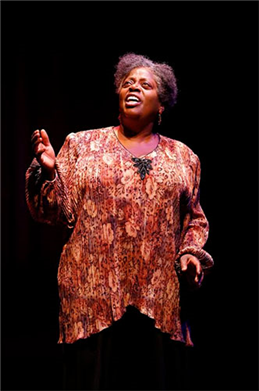By MARK BLANKENSHIP
When Osceola Mays sings "Oh Freedom," we can feel what it means to her.
One of two characters in
Texas in Paris, a play with music at the York Theatre Company, she's a black woman in her 80s, the daughter of a Texas sharecropper, who suddenly finds herself singing for the French in 1989.
This actually happened. After folklorist and writer Alan Govenar heard Osceola sing, he helped her get to France. He did the same for cowboy John Burruss, who favored prairie songs like "Git Along Little Dogies." The two performers didn't know each other before they shared a Parisian stage, and they had never dreamed of the spotlight. But for several nights, they treated Europeans to a taste of authentic American culture.
In the play, which Govenar wrote, the unlikely duo navigates the audience, the city, and each other, with varying degrees of success. And while John, the taciturn cowboy, despises the Parisian life, Osceola's flush with it.
"She was someone who saw the kindness and the light in people," says the actress Lillias White, who plays Osceola as a buoyant spirit. Even when John confesses how uncomfortable he feels talking to a black woman---it's against the way he was raised---she pushes right ahead with becoming his friend. "She was a very positive person and did not take hate for an answer," White says.
But she had certainly known hate. Considering who she was and when she lived, that was a given. And when she performs "Oh Freedom," the show underscores how that affected her. "Before I'd be a slave, I'd be buried in my grave," she sings. "And go home to my Lord and be free."
During this number, the room gets heavier. White sings her lowest, most mournful notes, and her body bends like it's carrying weight. "I believe there's a good part of Osceola standing there and feeling that sadness," says the actress. "She probably saw and heard a lot of terrible things that happened to black people in that period---lynchings and burnings and killings. She doesn't wear those memories on her sleeve, but for that moment she gives into them."
Crucially, though, "Oh Freedom" doesn't end the show. It informs our understanding of Osceola's happiness, and it adds texture to her interactions with John, but it's not the final word.
That's partly because the real concerts didn't end with "Oh Freedom" and partly because Govenar wants his play to carry a redemptive message.
After all, he kept in touch with Osceola and John, and he knows they remained friendly for the rest of their lives. "That's the story," Govenar says. "I didn't want it to be a documentary about their time in Paris. I wanted it to be about how they came to a deeper understanding of each other."
That's why his play, which invents the performers' off-stage conversations, bends so assuredly toward harmony, even as it acknowledges the terrible past.
To that end, <em>Texas In Paris</em> also addresses America's current racial firestorms. "With all the horrible things that have happened in the last six months, how do we deal with that?" Govenar asks, before pointing to the shared culture of the songs that John and Osceola perform.
"'Wade In the Water,' 'When the Saints Go Marching In'---these are the songs that ordinary Americans keep and cherish," Govenar says. "They're a way for us to see deeper into ourselves and appreciate the shared experiences that we all have."
---
Mark Blankenship is TDF's online content editor
Photo by Carol Rosegg
